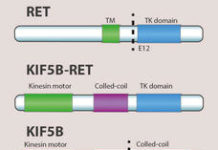The NCI-MATCH Trial Subprotocol H (EAY131-H) met its primary endpoint with the response rate of 37.9% and high rate of disease control in the mixed histology, pretreated cohort. With many different tumour types represented, many patients seemed to benefit from therapy for several months. Consistent with data in diseases such as melanoma and non-small cell lung cancer (NSCLC), de novo resistance to dabrafenib and trametinib was uncommon in this study, with only 2 patients having progressive disease as best response. The study investigators, who published their findings on 6 August 2020 in the Journal of Clinical Oncology, report that their findings suggest that BRAF/MEK inhibition is likely a viable treatment approach across a wide variety of BRAFV600 mutated cancers.
BRAF/MEK inhibitor therapy has shown promising clinical activity in certain cancers with BRAF mutations, such as melanoma, NSCLC and thyroid cancer. Early data suggested that responses may be histology dependent, because BRAF mutated colorectal cancer demonstrated a relative resistance to therapy. In many cancers, the incidence of BRAF mutations is low, and limited information exists regarding the sensitivity of other tumour types to BRAF/MEK inhibition.
The NCI-MATCH trial was designed as a platform precision medicine study in which patients were assigned to receive treatment on the basis of genetic testing results from pretreatment biopsies, irrespective of tumour type. Subprotocol H evaluated the BRAF inhibitor dabrafenib and MEK1/2 inhibitor trametinib in patients with solid tumours, lymphomas, or multiple myeloma whose tumours harboured a BRAFV600E/K/R/D mutation after progression on standard therapy.
The EAY131-H is an open-label, single-arm study. Patients with melanoma, thyroid, or colorectal cancer were excluded; patients with NSCLC were later excluded in an amendment. Patients received dabrafenib 150 mg twice per day and trametinib 2 mg per day continuously until disease progression or intolerable toxicity. The primary endpoint was centrally assessed objective response rate (ORR); secondary endpoints included progression-free survival (PFS), 6-month PFS, and overall survival (OS).
In total, 35 patients were enrolled, and 29 were included in the primary efficacy analysis as prespecified in the protocol. Median age was 59 years, and 45% of the patients had received ≥3 lines of therapy.
The confirmed ORR was 37.9% (90% confidence interval [CI], 22.9% to 54.9%) with p < 0.0001 against a null rate of 5%. The PFS was 11.4 months (90% CI, 8.4 to 16.3 months). Responses were seen in 7 distinct tumour types. Seven patients had a duration of response of >12 months, including 4 patients with a duration of response of >24 months. An additional 8 patients had a PFS >6 months. The median OS was 28.6 months.
Reported adverse events were comparable to those noted in previously reported profiles of dabrafenib and trametinib.
The authors wrote that this promising activity warrants additional investigations in BRAFV600 mutated tumours outside of currently approved indications. This study is an informative step in selecting patients for molecularly targeted therapy in BRAFV600 mutated cancers. It stands to serve as a foundation for future work focused on BRAFV600 mutated cancers that currently lack effective standard of care therapies. An expansion of this cohort is planned to better characterise the potential benefit of dabrafenib and trametinib in this patient population.
The study was supported by the National Cancer Institute of the US National Institutes of Health multiple grant awards.
Reference
Salama AKS, Li S, Macrae ER, et al. Dabrafenib and Trametinib in Patients With Tumors With BRAFV600E Mutations: Results of the NCI-MATCH Trial Subprotocol H. JCO; Published online 6 August 2020. DOI: 10.1200/JCO.20.00762









